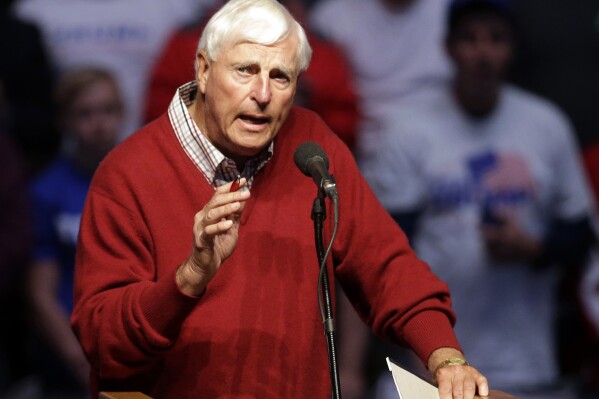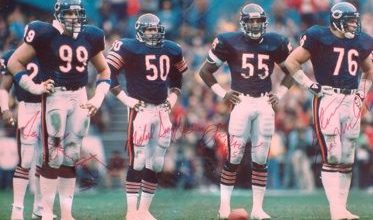Breaking News: Netflix Releases Documentary on Basketball Legend Bob Knight – The documentary chronicles Knight’s 29 seasons at Indiana University, a period marked by unprecedented success and undeniable controversy. His three national championships (1976, 1981, 1987), 11 Big Ten championships, and one National Invitation Tournament title cemented his

Netflix has released a documentary chronicling the life and career of one of college basketball’s most legendary, yet polarizing, figures: Bob Knight. The film dives deep into his 29 seasons as head coach of the Indiana University Hoosiers, a tenure that is synonymous with both unparalleled success on the court and an often controversial approach to coaching.
A Legacy of Winning
Bob Knight’s career at Indiana University is a tapestry of achievements that few coaches in the history of college basketball can match. With three national championships (1976, 1981, 1987), 11 Big Ten championships, and a National Invitation Tournament (NIT) title, Knight’s track record is impressive. His 662 career wins with the Hoosiers places him among the most successful coaches in NCAA history, and his influence extends beyond the victories. The documentary offers an in-depth look at how Knight’s strategic genius and ability to mold players into champions transformed Indiana basketball into a powerhouse.
But beyond the stats, Knight’s coaching philosophy set him apart. A firm believer in discipline and accountability, Knight instilled a sense of mental toughness in his players that became synonymous with Indiana’s style of play. His approach, often described as demanding and intense, was both revered and criticized. While some players and analysts praise his no-nonsense approach as the key to his success, others view it as a reflection of his harsh, sometimes aggressive methods.
The documentary does not shy away from examining the duality of Knight’s legacy. It provides a balanced portrayal, showcasing not only his triumphs but also the controversies that often clouded his career. It’s this mix of brilliance and volatility that made Knight both a beloved figure and a lightning rod for criticism.
The Highs: Championship Glory
The documentary opens with a focus on Knight’s early years at Indiana, where he quickly established himself as one of the most talented and promising young coaches in the country. The highlight of his career, of course, is his 1976 team, which remains the last NCAA Division I men’s basketball team to finish a season undefeated. The film captures the magic of that championship run, complete with interviews from former players like Quinn Buckner and Kent Benson, who recall the precision and discipline that defined the Hoosiers’ play.
Knight’s 1981 and 1987 national championships are also featured in the documentary, with a closer look at the evolution of his teams and his coaching strategies. In the 1981 title game, Indiana defeated North Carolina to secure Knight’s second national championship, cementing his status as one of the game’s greats. The 1987 national championship, which came after a brief lull in Knight’s career, was a significant moment for both Knight and the Hoosiers. The documentary examines how Knight was able to rebuild his program and lead it to the pinnacle of college basketball once again.
The triumphs of these championship teams are explored through rare archival footage and firsthand accounts from players and coaches. Knight’s players, many of whom went on to successful professional careers, speak candidly about the impact that Knight had on their lives, both on and off the court. The film also emphasizes Knight’s ability to recruit and develop talent, with players like Isiah Thomas, Steve Alford, and Calbert Cheaney standing as prime examples of his knack for recognizing and nurturing potential.
The Controversies: A Shadow Over Success
However, for all of Knight’s on-court success, his legacy has often been overshadowed by controversy. The documentary does not shy away from this aspect of his career, and much of the narrative is centered around Knight’s notorious temper, his frequent clashes with the media, and his sometimes combative relationship with players.
Perhaps the most infamous incident in Knight’s career came in 1985 when he was caught on camera choking one of his players, Neil Reed, during a practice. The footage, which was released years later, sent shockwaves through the college basketball world. While Knight maintained that the incident was blown out of proportion, the documentary examines the lasting impact of that moment, both on Reed and the broader college basketball community.
In addition to the choking incident, Knight was involved in multiple public altercations, both with players and referees. His fiery demeanor earned him a reputation as one of the most volatile coaches in the history of the sport. The documentary offers candid reflections from former players who recount tense moments with Knight, providing insight into the pressure-cooker environment that defined the Hoosiers’ locker room.
Another point of contention was Knight’s often abrasive interactions with the media. He frequently clashed with reporters, displaying a disdain for the press that sometimes veered into outright hostility. His most famous outburst came in 1984 when, after a game against Purdue, Knight was caught on camera berating a reporter who asked him about his team’s performance. His tendency to lash out at the media, combined with his sometimes harsh treatment of players, earned him a reputation as a coach who was as divisive as he was successful.
Despite the controversies, Knight was never one to apologize for his behavior. In the documentary, several of his former players discuss their complex relationship with him, acknowledging that while Knight’s methods were often harsh, they believed he cared deeply about their success. For many, the discipline and structure that Knight instilled were seen as necessary elements in their development as athletes and individuals.
A Complex Legacy
The documentary delves into the broader implications of Knight’s coaching career, exploring the complex nature of his legacy. Was he a tyrant, as some critics suggest, or a genius who pushed his players to be their best? The film makes it clear that Knight’s influence on the game cannot be overstated. His ability to recruit top talent, develop players, and craft championship-caliber teams made him a legend in college basketball. Yet, his methods remain a point of contention.
One of the most poignant parts of the documentary is the examination of Knight’s departure from Indiana in 2000. After years of clashes with university officials, his tenure ended abruptly following allegations of inappropriate behavior toward students and staff. The documentary explores the fallout from his firing, with interviews from former players who express their shock and disappointment at the way Knight’s career ended. For many, his departure marked the end of an era in college basketball, one where the game was defined by Knight’s intensity and focus.
In the final moments of the documentary, the film reflects on the lasting impact of Bob Knight on college basketball and sports culture as a whole. While his career was marked by controversy, his influence on the game is undeniable. He set a standard for excellence in coaching, one that few have been able to match. And despite the controversies that swirled around him, many of his players still hold Knight in high regard, recalling the discipline and focus that he instilled in them as lessons that went far beyond basketball.
The documentary closes with a look at Knight’s life after Indiana, where he has remained a prominent figure in the basketball world. Though he has largely stayed out of the public eye, his legacy continues to be a subject of discussion among sports fans, analysts, and former players alike. Knight’s career may have been marked by highs and lows, but the documentary makes it clear that his impact on the game of basketball will be felt for generations to come.
As Netflix’s documentary on Bob Knight shows, the coach’s life and career were far from simple. He was a man of contradictions—an intensely driven winner with a tempestuous nature, a teacher and a tyrant, a leader who demanded the best from his players, sometimes at great personal cost. But in the end, Knight’s legacy remains as complex and enduring as the sport of basketball itself.









